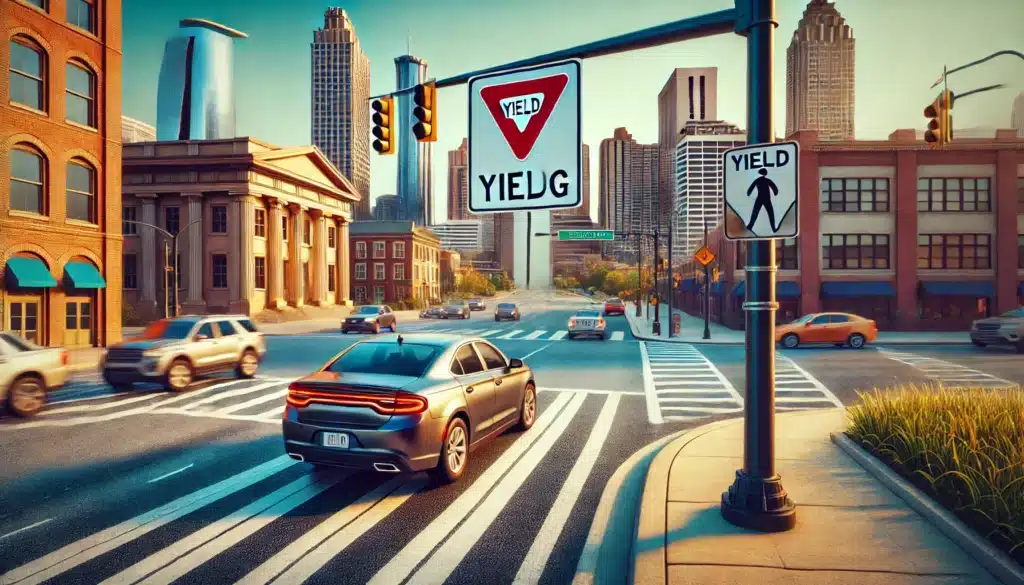Yielding in Personal Injury Cases | Jamie Ballard Law
Yielding, as it refers to personal injury lawyers and cases, is the act of giving way to another vehicle or pedestrian in traffic situations to avoid collisions and ensure safety on the road. Failing to yield the right-of-way is a common cause of traffic accidents and can lead to serious injuries or even fatalities. Understanding the rules of yielding and how they apply to personal injury cases is important for establishing liability and seeking compensation for injuries sustained in an accident.
Definition of Yielding
Yielding means allowing another vehicle or pedestrian to proceed before you in a traffic situation. It is governed by traffic laws designed to prevent accidents and maintain orderly flow on the roads. Common scenarios that require yielding include:
- At intersections: Drivers must yield to oncoming traffic when making left turns.
- At stop signs: Drivers must yield to vehicles that have the right-of-way at the intersection.
- For pedestrians: Drivers must yield to pedestrians at crosswalks.
- Merging lanes: Vehicles entering a highway or merging lanes must yield to the traffic already on the road.
Yielding in Different Types of Accidents:
Car Accidents: In the case of car accidents, yielding typically involves the right of way at intersections, merges, and turns. Failure to yield can result in collisions and injuries, leading to legal implications. Understanding when to yield and the relevant traffic laws is helpful for safe driving and preventing accidents.
Slip and Fall Accidents: Property owners have a duty to maintain a safe environment for visitors. If hazardous conditions exist and the property owner fails to address them, they may be found negligent for not yielding to their responsibility. Victims of slip and fall accidents can seek compensation for their injuries and damages caused by the property owner’s failure to yield.
Workplace Accidents: Employers have a duty to provide a safe work environment for their employees. This includes yielding to safety regulations, training programs, and maintenance protocols to prevent accidents and injuries. When an employer disregards these responsibilities, they may be held liable for workplace accidents through workers’ compensation claims.
Bicycle Accidents: Cyclists have the right to the road and must be yielded to by motorists in certain situations. Failure to yield to cyclists can result in accidents and serious injuries. Understanding the rules of the road and yielding to vulnerable road users can help prevent bicycle accidents and promote road safety.
Pedestrian Accidents: Drivers are required to yield to pedestrians in crosswalks and intersections. Pedestrian right-of-way laws exist to protect walkers and ensure their safety on the road. Failing to yield to pedestrians can lead to accidents and legal consequences for negligent drivers.
Motorcycle Accidents: Motorcyclists are often vulnerable on the road and rely on drivers to yield to their presence. Vehicle blind spots, failure to yield during lane changes, and aggressive driving behaviors can result in motorcycle accidents. Understanding when to yield to motorcyclists can help prevent collisions and promote road sharing.
Importance of Yielding in Personal Injury Cases
Failing to yield the right-of-way is a significant factor in many traffic accidents. When a driver fails to yield, it can result in collisions that cause severe injuries or even death. In personal injury cases, proving that the other party failed to yield is important for establishing liability and seeking compensation for damages.
Legal Implications of Yielding:
Liability: Determining who had the right of way and failed to yield in an accident is critical for establishing liability. The party at fault for not yielding may be held responsible for damages and injuries caused by the accident.
Negligence: Failing to yield when required by law can be considered negligent behavior. Negligence may result in legal consequences, such as compensation claims and civil lawsuits, for the negligent party.
Compensation: Victims of accidents where yielding played a role may be entitled to compensation for their injuries, medical expenses, lost wages, and pain and suffering. Seeking legal representation can help victims understand their rights and pursue the appropriate compensation.
Insurance Claims: When yielding is a factor in an accident, filing an insurance claim becomes helpful for obtaining compensation. Insurance companies will assess liability based on yielding rules and determine the coverage and benefits available to accident victims.
Proving Negligence in Yielding Cases
To establish liability in a personal injury case involving failure to yield, the plaintiff must prove that the defendant was negligent. This involves demonstrating that the defendant failed to exercise reasonable care by not yielding the right-of-way, and that this failure directly caused the accident and resulting injuries.
Steps to Prove Negligence
- Duty of Care: Establish that the defendant had a legal duty to yield the right-of-way.
- Breach of Duty: Show that the defendant breached this duty by failing to yield.
- Causation: Prove that the defendant’s failure to yield directly caused the accident.
- Damages: Demonstrate that the plaintiff suffered injuries and damages as a result of the accident.
Role of an Experienced Personal Injury Lawyer
Navigating personal injury cases involving failure to yield requires specialized legal knowledge and experience. Jamie Ballard, an experienced personal injury lawyer in Atlanta, is dedicated to helping clients understand their rights, identify negligence, and secure the compensation they deserve. With years of experience handling complex personal injury cases, Jamie Ballard Law can provide the expert guidance you need.
How Jamie Ballard Law Can Help
Comprehensive Case Evaluation
Our legal team will thoroughly review the details of your case, gather evidence, and assess the circumstances surrounding the accident to determine if failure to yield was a factor.
Expert Legal Guidance
We will explain your rights, the legal process, and the potential outcomes of your case. Our goal is to ensure you are fully informed and prepared to pursue your claim.
Aggressive Representation
Jamie Ballard Law will fight tirelessly to prove negligence and liability, working to secure the maximum compensation for your injuries, medical expenses, lost wages, and pain and suffering.
At Jamie Ballard Law, we understand the importance of yielding in accident cases and how it can impact legal proceedings. Our experienced team of personal injury lawyers is dedicated to helping clients navigate the complexities of yielding laws and seek the compensation they deserve. Whether you’ve been involved in a car accident, slip and fall, or other type of accident, we are here to provide expert legal guidance and support.
Based on 44 reviews
Contact Jamie Ballard Law Today:
If you’ve been injured in an accident where yielding was a factor, don’t hesitate to contact Jamie Ballard Law for a consultation. We will review your case, explain your rights, and guide you through the legal process to secure the compensation you need. Yielding is a important element in personal injury law, and our team is here to help you understand its implications and protect your interests.
By working with Jamie Ballard Law, you can be confident that you have a dedicated legal advocate on your side, fighting for your rights and best interests. Contact us today to schedule a consultation and start the journey towards recovering from your accident. Yielding matters, and we’re here to help you navigate it effectively. Call 404-885-8544 for help.


